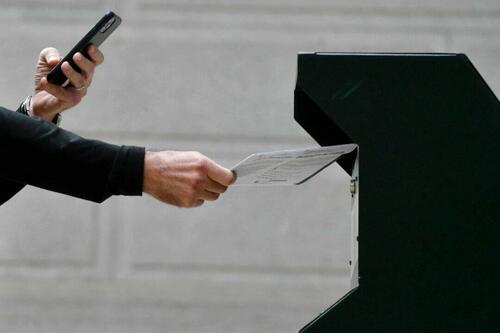
Authored by Zachary Steiber via The Epoch Times (emphasis ours),
Pennsylvania rules that require mail-in ballots to be dated are legal, a federal appeals court has ruled.

A state law that says voters must fill out, date, and sign envelopes containing the ballots is not prevented by the Civil Rights Act of 1964, a majority said in the March 27 ruling.
The act bans denying “the right of any individual to vote in any election because of an error or omission on any record or paper relating to any application, registration or other act requisite to voting.”
But that provision “only applies when the state is determining who may vote,” U.S. Circuit Court Judge Thomas Ambro, appointed by former President Bill Clinton, wrote for the majority of a U.S. Court of Appeals for the Third Circuit panel. “In other words, its role stops at the door of the voting place. The provision does not apply to rules, like the date requirement, that govern how a qualified voter must cast his ballot for it to be counted.”
The same court ahead of the 2022 election ruled that state officials must count undated ballots but the U.S. Supreme Court vacated that order. After the state’s acting secretary of state said counties should still count undated ballots, the Pennsylvania Supreme Court ruled that counties could not count mail-in ballots with missing or incorrect dates. About 7,900 ballots were not counted in the 2020 election because they were missing a signature or date, or had an inaccurate date, according to state officials.
U.S. District Judge Susan Paradise Baxter later ruled that the Pennsylvania law violated the Civil Rights Act provision, meaning Pennsylvania officials had to count mail-in ballots even if they lacked dates, or contained inaccurate dates.
“Federal law prohibits a state from erecting immaterial roadblocks, such as this, to voting,” Judge Baxter, appointed by former President Donald Trump, wrote at the time, referring to the Pennsylvania law.
According to the law, a voter casting a ballot by mail must mark the ballot, then place it inside a provided envelope. That envelope must then be placed into a second envelope, which contains the areas for the date and signature.
“The elector shall then fill out, date and sign the declaration printed on such envelope,” the law states.
The Republican National Committee (RNC) and other groups appealed Judge Baxter’s ruling, arguing that her conclusion was wrong.
“This is a crucial victory for election integrity and voter confidence in the Keystone State and nationwide. Pennsylvanians deserve to feel confident in the security of their mail ballots, and this 3rd Circuit ruling roundly rejects unlawful left-wing attempts to count undated or incorrectly dated mail ballot,” Michael Whatley, the RNC’s chairman, said in a statement after the new ruling was handed down.
Groups that sued over the law expressed disappointment.
“If this ruling stands, thousands of Pennsylvania voters could lose their vote over a meaningless paperwork error. The ballots in question in this case come from voters who are eligible and who met the submission deadline,“ Mike Lee, executive director of the American Civil Liberties Union of Pennsylvania, said in a statement. ”In passing the Civil Rights Act, Congress put a guardrail in place to be sure that states don’t erect unnecessary barriers that disenfranchise voters. It’s unfortunate that the court failed to recognize that principle. Voters lose as a result of this ruling.”
The ruling can be appealed to the U.S. Supreme Court, but the groups have not yet indicated whether they'll appeal.
Justice Samuel Alito has said that the Pennsylvania law did not appear to violate the Civil Rights Act provision because it did not deny people the right to vote.
“When a mail-in ballot is not counted because it was not filled out correctly, the voter is not denied ’the right to vote,'” he said previously. “Rather, that individual’s vote is not counted because he or she did not follow the rules for casting a ballot.”
Several other justices supported his view, offered in a dissent when the rest of the court initially said Pennsylvania counties could keep counting undated ballots.
Judge Ambro offered similar rationale, writing that the provision “targets laws that restrict who may vote” and “does not preempt state requirements on how qualified voters may cast a valid ballot, regardless what (if any) purpose those rules serve.”
He was joined by U.S. Circuit Judge Cindy Chung, who was appointed by President Joe Biden.
U.S. Circuit Judge Patty Shwartz, an appointee of President Barack Obama and the third member of the panel that ruled, said in a dissent that the provision “means that state actors cannot deprive a voter of the right to vote due to an error or omission he makes on papers that he must complete to have his ballot counted, including on papers distinct from application or registration forms, if the mistake is not relevant to the State’s ability to ascertain whether he is qualified under state law to vote in the election.”
Authored by Zachary Steiber via The Epoch Times (emphasis ours),
Pennsylvania rules that require mail-in ballots to be dated are legal, a federal appeals court has ruled.

A state law that says voters must fill out, date, and sign envelopes containing the ballots is not prevented by the Civil Rights Act of 1964, a majority said in the March 27 ruling.
The act bans denying “the right of any individual to vote in any election because of an error or omission on any record or paper relating to any application, registration or other act requisite to voting.”
But that provision “only applies when the state is determining who may vote,” U.S. Circuit Court Judge Thomas Ambro, appointed by former President Bill Clinton, wrote for the majority of a U.S. Court of Appeals for the Third Circuit panel. “In other words, its role stops at the door of the voting place. The provision does not apply to rules, like the date requirement, that govern how a qualified voter must cast his ballot for it to be counted.”
The same court ahead of the 2022 election ruled that state officials must count undated ballots but the U.S. Supreme Court vacated that order. After the state’s acting secretary of state said counties should still count undated ballots, the Pennsylvania Supreme Court ruled that counties could not count mail-in ballots with missing or incorrect dates. About 7,900 ballots were not counted in the 2020 election because they were missing a signature or date, or had an inaccurate date, according to state officials.
U.S. District Judge Susan Paradise Baxter later ruled that the Pennsylvania law violated the Civil Rights Act provision, meaning Pennsylvania officials had to count mail-in ballots even if they lacked dates, or contained inaccurate dates.
“Federal law prohibits a state from erecting immaterial roadblocks, such as this, to voting,” Judge Baxter, appointed by former President Donald Trump, wrote at the time, referring to the Pennsylvania law.
According to the law, a voter casting a ballot by mail must mark the ballot, then place it inside a provided envelope. That envelope must then be placed into a second envelope, which contains the areas for the date and signature.
“The elector shall then fill out, date and sign the declaration printed on such envelope,” the law states.
The Republican National Committee (RNC) and other groups appealed Judge Baxter’s ruling, arguing that her conclusion was wrong.
“This is a crucial victory for election integrity and voter confidence in the Keystone State and nationwide. Pennsylvanians deserve to feel confident in the security of their mail ballots, and this 3rd Circuit ruling roundly rejects unlawful left-wing attempts to count undated or incorrectly dated mail ballot,” Michael Whatley, the RNC’s chairman, said in a statement after the new ruling was handed down.
Groups that sued over the law expressed disappointment.
“If this ruling stands, thousands of Pennsylvania voters could lose their vote over a meaningless paperwork error. The ballots in question in this case come from voters who are eligible and who met the submission deadline,“ Mike Lee, executive director of the American Civil Liberties Union of Pennsylvania, said in a statement. ”In passing the Civil Rights Act, Congress put a guardrail in place to be sure that states don’t erect unnecessary barriers that disenfranchise voters. It’s unfortunate that the court failed to recognize that principle. Voters lose as a result of this ruling.”
The ruling can be appealed to the U.S. Supreme Court, but the groups have not yet indicated whether they’ll appeal.
Justice Samuel Alito has said that the Pennsylvania law did not appear to violate the Civil Rights Act provision because it did not deny people the right to vote.
“When a mail-in ballot is not counted because it was not filled out correctly, the voter is not denied ’the right to vote,’” he said previously. “Rather, that individual’s vote is not counted because he or she did not follow the rules for casting a ballot.”
Several other justices supported his view, offered in a dissent when the rest of the court initially said Pennsylvania counties could keep counting undated ballots.
Judge Ambro offered similar rationale, writing that the provision “targets laws that restrict who may vote” and “does not preempt state requirements on how qualified voters may cast a valid ballot, regardless what (if any) purpose those rules serve.”
He was joined by U.S. Circuit Judge Cindy Chung, who was appointed by President Joe Biden.
U.S. Circuit Judge Patty Shwartz, an appointee of President Barack Obama and the third member of the panel that ruled, said in a dissent that the provision “means that state actors cannot deprive a voter of the right to vote due to an error or omission he makes on papers that he must complete to have his ballot counted, including on papers distinct from application or registration forms, if the mistake is not relevant to the State’s ability to ascertain whether he is qualified under state law to vote in the election.”
Loading…




